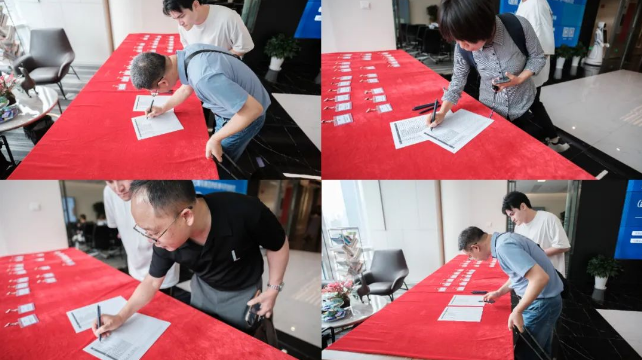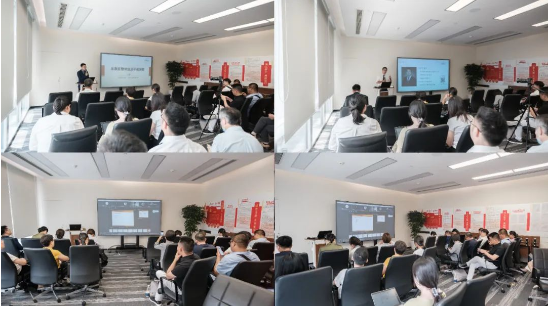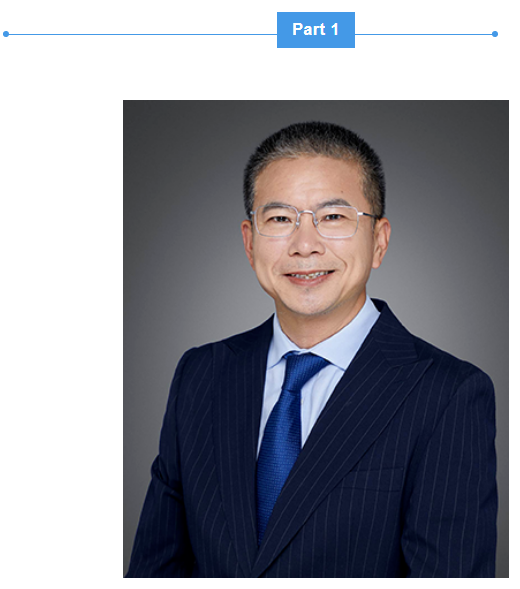Translator:Wang Yichun
On August 25, 2023, Landing Law Offices, in association with the renowned online legal services platform and legal tech firm Yifa Tong, co-hosted a specialized seminar focusing on "Opportunities and Risks for Chinese Enterprises Expanding into Southeast Asia."

The event gathered thirty distinguished representatives from diverse sectors such as shipping, import/export, construction equipment, technology, automotive, healthcare, and new materials. These experts collectively discussed and shared insights on the pivotal aspects of opportunities and risk mitigation strategies for Chinese companies looking to venture into Southeast Asia.

The session featured an esteemed panel that included Mr Liu Yixing, Director of Landing’s Global Management Committee, Senior Partner Ms Huang Xueshan, Ms Qin Peijia based in Indonesia, and Ms Yang Jiyu based in Vietnam. They offered a comprehensive overview of the entire cycle of business expansion into Southeast Asia and also provided nuanced analyses tailored to primary investment destinations like Vietnam, India, and Indonesia.
The topics discussed by the guest speakers are as follows:

Mr Liu Yixing
Director of Landing's Global Management Committee
Topic: An Overview of Southeast Asia's Investment Landscape
Director Liu Yixing offered a holistic view of Southeast Asia, dissecting the prevalent challenges that Chinese companies generally face when venturing into the region. He emphasized the critical role of international engagement in successful overseas investments, advocating for meticulous field research before making any investment decisions.
Owing to historical factors, a bureaucratic culture from old time prevails in many Southeast Asian countries. Chinese businesses often find themselves competing against local aristocrats, influential political families, and regional factions. For instance, traditional manufacturing sectors in India are dominated by incumbents who might leverage local influences to initiate anti-dumping investigations against Chinese companies. Consequently, a nuanced understanding of the socio-cultural backdrop of the investment location is imperative.
Director Liu Yixing, drawing upon his extensive career experience, identified three common misconceptions Chinese businesses hold regarding investments in Southeast Asia:
Firstly, the erroneous perception that labor costs are low. Contrarily, the overall skill level and productivity in Southeast Asia are generally low, resulting in a higher average management cost per employee compared to China.
Secondly, an overreliance on personal networks often leads Chinese entrepreneurs to overlook due diligence or other safeguarding measures, increasing the risk of embezzlement or infringement within familiar relationships.
Thirdly, a widespread neglect of tax planning. Southeast Asian tax authorities wield significant power and are stringent about tax compliance. Law enforcement authorities in Southeast Asian nations often utilize taxation as the initial focus when conducting audits on Chinese corporations, and any issues could lead to severe consequences.
Hence, it's vital for Chinese companies considering investments in Southeast Asia to familiarize themselves with the local socio-cultural, legal landscapes, and to strategically plan ahead.

Ms Huang Xueshan
Senior Partner at Landing Law Offices, Shenzhen Branch
Topic: Comprehensive Analysis of India's Investment Climate and Guidance for Chinese Enterprises
Ms Huang Xueshan initiated her talk by delineating the evolving landscape of regulatory policies and law enforcement approaches towards Chinese enterprises in India. She emphasized that the Indian government demonstrates high sensitivity in its policies concerning Chinese enterprises, with a noticeable shift towards a less accommodating stance since 2020. Furthermore, Indian law enforcement agencies have increasingly exhibited a trend of excessive enforcement against Chinese businesses in recent years.
In addressing challenges such as unwarranted inspections, overzealous enforcement, and corruption in India, Huang advised companies to exercise restraint and rationality. She strongly discouraged solving issues through bribing or other unlawful measures, recommending instead that companies engage accountants and legal experts to prepare documentation and formulate countermeasures.
Additionally, Ms Huang Xueshan elaborated on the principal avenues through which Chinese companies venture into India. She provided in-depth insights on the complexities, relevance, and key tactical considerations concerning Foreign Direct Investment (FDI) approvals, setting up a Branch Office (BO), and the Variable Interest Entity (VIE) structure.

Ms Qin Peijia
Attorney at Landing Law Offices (Based in Indonesia)
Topic: Comprehensive Analysis of Indonesia's Investment Climate and Guidance for Chinese Enterprises
Ms Qin Peijia delivered an exhaustive overview of the current investment climate in Indonesia. She outlined that the investment avenues open to foreign investors are diverse, encompassing sectors like agriculture, mining and metallurgy, energy, real estate, manufacturing, industrial zones, digital economy, and financial services. Notably, the finance, construction, electric vehicles, and e-commerce sectors have emerged as the most attractive areas for investment.
As for market entry, Indonesian investment opportunities can be classified into four key industry types: fully open, prohibited, restricted, and incentivized. Remarkably, 18 trailblazing sectors qualify for tax holiday benefits, entitling them to a minimum of five years of corporate income tax exemptions.
On the subject of regulatory compliance, Ms Qin Peijia elucidated the prevailing Indonesian norms concerning foreign business operations, requisite qualifications, company formation protocols, governance structures, daily operations, land tenure, financial and tax frameworks, and employment regulations. She further offered tactical advice to address frequent challenges encountered by investors, such as issues related to trademarks, import/export procedures, taxation, labor relations, and the risks and mitigations associated with joint ventures.

Ms Yang Jiyu
Attorney at Landing Law Offices, Shenzhen Branch (Based in Vietnam)
Topic: Comprehensive Analysis of Vietnam's Investment Climate and Guidance for Chinese Enterprises
Ms Yang Jiyu offered an in-depth analysis of Vietnam's foreign investment landscape, drawing from recent data. The figures indicate a progressive uptick in the number of foreign investors attracted to Vietnam during the first half of 2023.
Vietnam's investment environment benefits from consistent policies enacted by the ruling party and an increasingly hospitable business climate for foreign entities. The country also enjoys a surplus of labor with relatively low labor costs, as well as a strategically advantageous geographical location facilitating maritime transport. However, these benefits come with certain caveats, including the inconsistent creditworthiness of local Vietnamese companies and a generally lower skill level within the labor force.
Drawing on his extensive field experience, Ms Yang Jiyu meticulously outlined the preparatory aspects Chinese enterprises should focus on when considering investments in Vietnam. She provided nuanced interpretations of the legal stipulations and policy requirements across a range of areas, from foreign investment restrictions and shareholding proportions to investor identity considerations, certificates of origin, tax incentives, land use policies, land and labor costs, and types of corporate entities.

兰迪律师官方微信

兰迪全球官方微信